ST. GEORGE, UTAH — Just 120 miles northeast of Las Vegas, many of the luxuries area residents have not had for over two months are now readily available.
St. George lifted voluntary restrictions May 1 on businesses that had reduced operations since March 18 to slow the spread of the coronavirus. Restaurants now are allowed to have customers dine in, and gatherings of up to 20 people are permitted.
On Tuesday, people were strolling the city streets, most of them not wearing face masks. But workers in retail and food establishments were wearing them, and they and customers seemed to be following social distancing guidance.
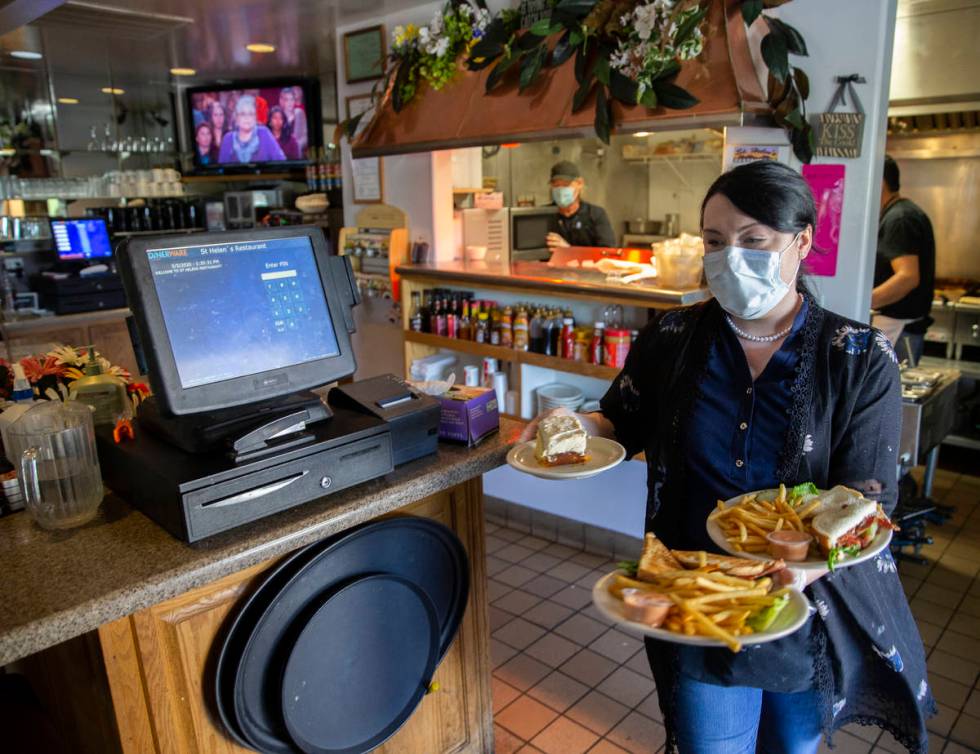
With 95 COVID-19 cases in surrounding Washington County, residents haven’t been too worried about the coronavirus, said Lane Stromberg, manager of St. Helen’s Restaurant and Sports Bar in Washington, just outside St. George.
St. Helen’s returned to full service May 1, removing a third of its tables to allow for social distancing. The restaurant had been open for takeout-only before that, except for two weeks when it was closed.
The reopening couldn’t come soon enough for Stromberg, whose wife owns the business. The couple had to raid their savings last month to keep the restaurant afloat.
“It’s been a tough go, as you don’t realize how much you live off your daily cash flow,” Stromberg said. “It’s like everything came to an abrupt halt on the 17th or 18th of March. We had to pull $50,000 to $60,000 just to finish up that first quarter for all of our purveyors.”
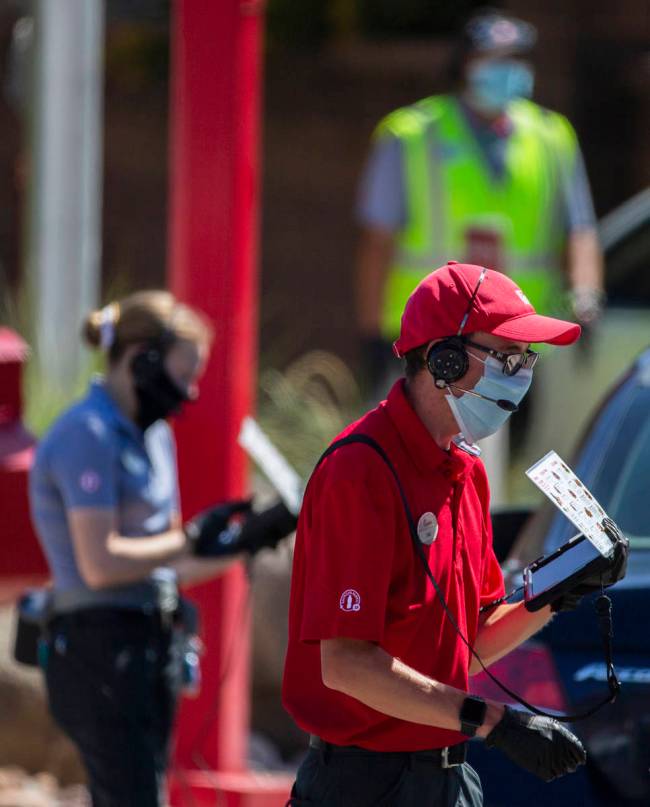
On Tuesday afternoon, about a dozen people were eating as employees went about their work, wearing masks and gloves and regularly cleaning their work stations with sanitation wipes.
Some businesses considered nonessential didn’t close despite the directive from Gov. Gary Herbert.
Be Hot Yoga studio in St. George kept its 5,000-square-foot-plus facility open during the soft shutdown but limited classes to nine and one instructor, with markings on the ground to ensure social distancing, said Lisa Feelove, who owns the studio with her husband, Jasher. The studio also halted use of equipment such as bands and kettlebells and stopped renting yoga mats. Each studio was sanitized after each class.
When restrictions were loosened, the studio began allowing up to 25 people per class, while still following social distancing protocols.
“We did stay open (during the five-week shutdown),” Feelove said. “But I think we’re more of a mental health facility at this point. Where people could come and have a safe place to be and feel like there was some semblance of normality. We definitely had fewer classes and (lower) class sizes.”
Feelove and her husband also own the adjoining Feelove Coffee shop, which had a steady flow of customers Tuesday.
The traffic was a welcome sight for Feelove, who saw revenue decline under the stay-home directive.
“We probably dropped down to about 25 percent of what we were doing, but we were able to keep our employees and were able to pay our employees,” she said. “We have people sitting outside here today. … It’s been amazing.”
We did stay open (during the five week shutdown). But I think we’re more of a mental health facility at this point. Where people could come and have a safe place to be and feel like there was some semblance of normality. We definitely had fewer classes and (lower) class sizes.
Lisa Feelove, owner of Be Hot Yoga studio in St. George
Salon Khroma also didn’t close during the shutdown, but business plunged before picking up last week when state officials lowered the COVID-19 threat level to moderate.
“We were at like 30 percent of our usual clients,” hair stylist Vanessa Faylor said. “Last week was my first full week back (to normal business levels).”
Wearing masks is optional at the salon for both stylists and customers, with Faylor the only stylist among four wearing one.
Most customers didn’t wear face masks during the soft shutdown and didn’t request the stylists wear them either, Faylor said. But she said she has seen an increased demand for stylists to don coverings since more customers started coming out.
xx
Constitutional debate plays out in Kingman
KINGMAN, ARIZ. — It was quiet along famed Route 66 on Tuesday. The gift shops that sprinkle the main drag had barred their doors. Outside one family’s home was a sign from a 6-year-old named Carter, to his dad working at the nearby prison: “Thank you, dad. Please stay safe. We love you and appreciate you.”
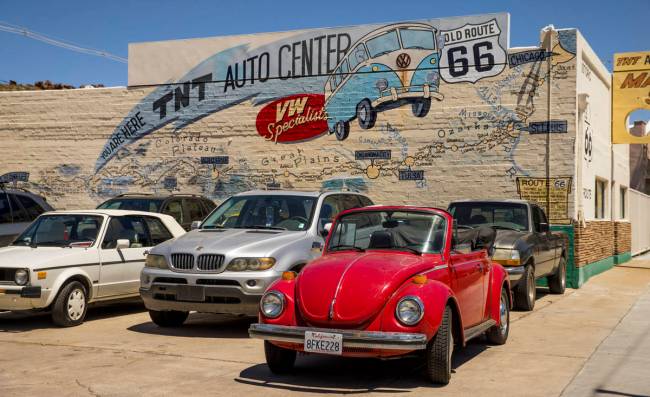
Kingman’s restaurants were serving customers through pickup or delivery, and benches at the nearby park were roped off. But most of the patrons at a gas station weren’t wearing masks and didn’t pay much attention to social distancing marks on the floor inside.
The city and the state were just days away from the return of some semblance of normalcy: Arizona Gov. Doug Ducey on Monday accelerated his phased reopening plan originally set to start on May 15, saying barbershops, salons and other businesses could resume services by appointment on Friday if they limit occupancy and implement sanitation and social distancing measures, as Nevada’s businesses are doing.
After the weekend, restaurants and coffee shops can start offering dine-in service with reduced occupancy.
I cannot in good conscience and will not control the legal free movement of others based on directives that I believe are in conflict with the Constitution. Law enforcement should not become the social distancing police.
Mohave County Sheriff Douglas Schuster
Kingman, which has a population of more than 30,000, is the county seat of Mohave County, which as of Friday had reported 165 COVID-19 cases and 18 deaths.
County Sheriff Douglas Schuster parted ways with the governor last week by saying that he had no intention of citing or arresting business owners or individuals who violated the state’s emergency coronavirus restrictions.
“I cannot in good conscience and will not control the legal free movement of others based on directives that I believe are in conflict with the Constitution,” Schuster wrote in a statement. “Law enforcement should not become the social distancing police.”
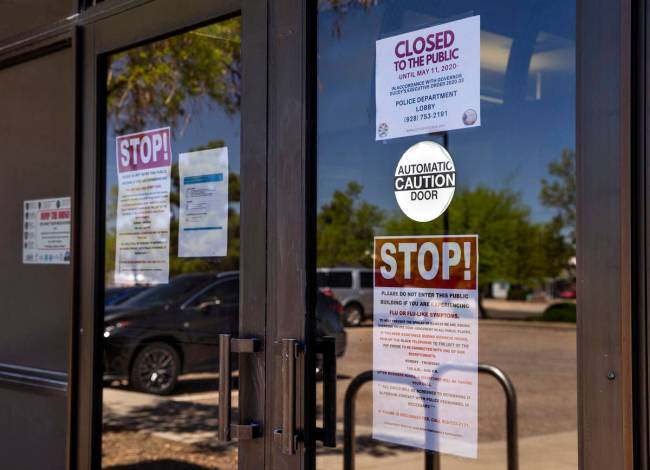
But in Kingman, the local police department operates under the mayor, and enforcement of the closure of nonessential businesses has continued.
Police Chief Rusty Cooper said that two of the department’s 54 officers had been dedicated to make sure that people are educated about the emergency directive and that only “a half a dozen or so” businesses had been directed to close ahead of the easing of restrictions.
“There’s a few people asking if we have the same stance (as the sheriff,) and the answer is, ‘No, we don’t,’” he said.
“Most municipal police agencies are in the same boat, and are all trying to navigate the constitutional rights of our citizens and the laws of our communities, and it’s a delicate balance,” he went on. “We understand people’s livelihoods are at stake, and we’re trying to protect the health of our community, as well.”
On Route 66, Ed Mann, 42, who runs the bicycle repair shop The SpokesMann, let folks in one at a time. On Tuesday, he wrapped a bandanna over his handlebar mustache and examined Mark Thompson’s steel frame bike.
Though his business remained open as essential for transportation, Mann said it has been struggling. And he fears many other nearby shops may not reopen.
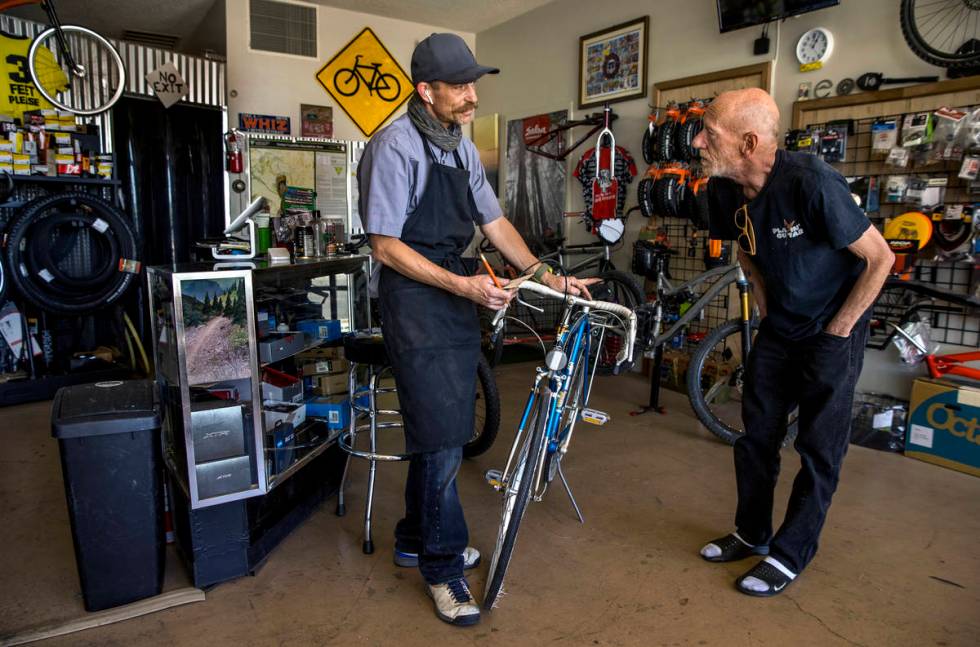
“I have a feeling I’m going to lose more than half of my fellow businesses out here,” he said, adding that this is typically the busiest time because of the good weather, snowbirds and people who have extra cash from tax season.
But some small businesses in Kingman are raring to go. Stephanie Wilkerson, owner of the Slightly High Maintenance hair and nail salon, decided she couldn’t wait for the governor to ease restrictions and reopened the shop two weeks early, on May 1.
She said she agreed with the sheriff and felt compelled to open not only because it was the salon’s 12th anniversary but because her employees were ready to get back to work.
“Every day is a risk to live life, and I was just at the point of like, ‘Nobody is paying my bills,’ so I was going to take the proper precautions, as long as my customers were willing to come in,” she said.
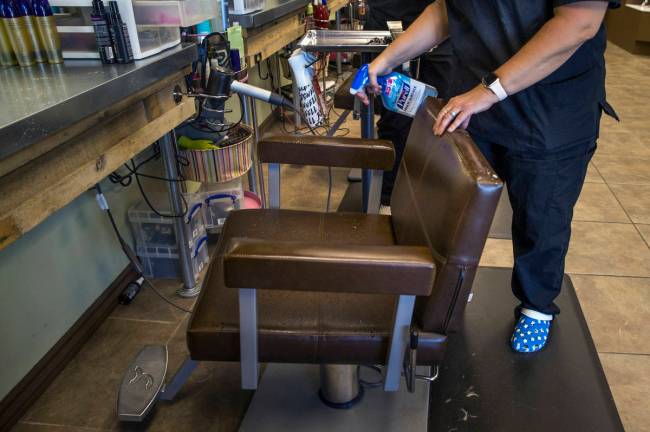
The salon provides masks for clients who want them, but most decline them. On Tuesday, neither Wilkerson nor her workers were wearing masks but would wear them upon request.
Customers who are getting their nails done get their nails scrubbed first with a special medical-grade cleanser, and partitions are available to prevent clients and nail technicians from breathing directly on one another. Most customers also pass on those, Wilkerson said.
She also bought an air purifier and locks the door to ensure that no more than 10 people are in the shop at once.
“It’s been great. Customers are happy, they want to hug you,” Wilkerson said. “Getting back to normal is what they want to do because we’re like therapy for them.”
Debbie Clinger, 61, got her nails painted a hot pink color Tuesday, and said she was thrilled to get back to the salon.
“It’s sad that people have lost their lives, without a doubt, but we all know what the risks are, we all do. And I think they should give us the liberty to make our own decision. I think my chances are better here than at the grocery store with 150 other people,” she said.
“If you’re scared, don’t go out; but don’t criticize me for getting my nails done.”
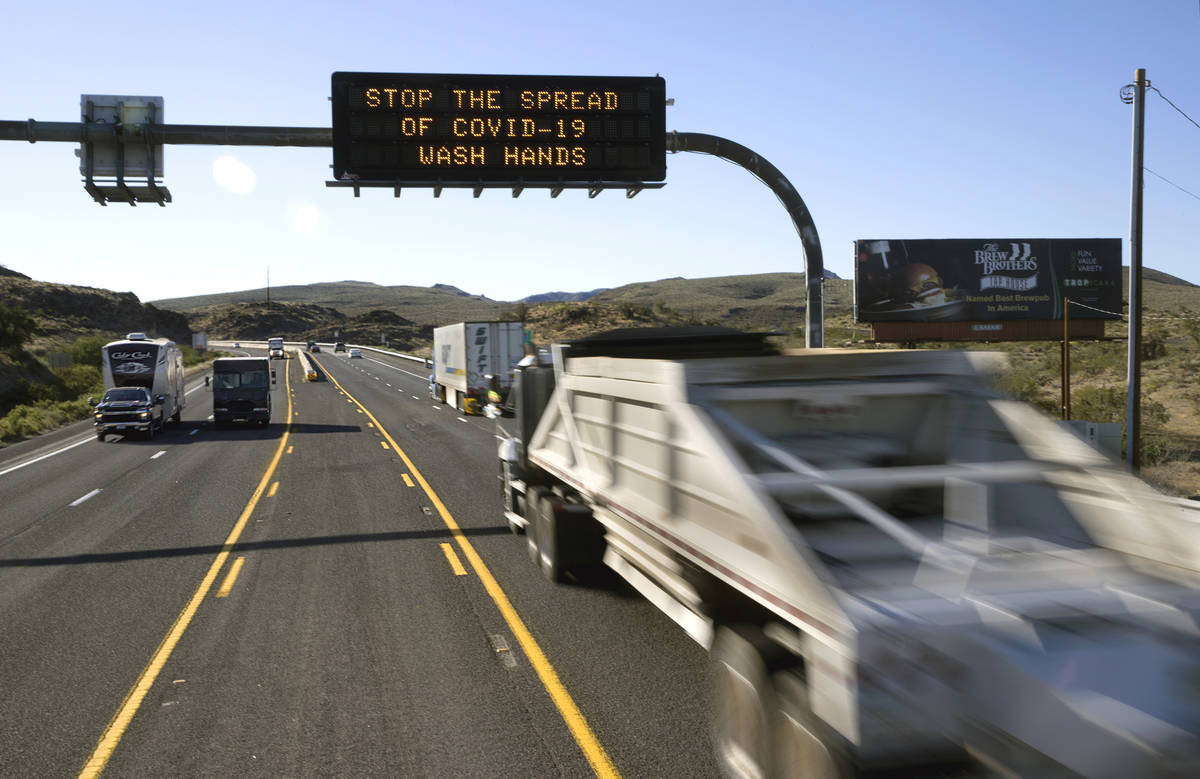
In Barstow, ‘We all need money’
BARSTOW, Calif. — Residents of this high desert city are following Gov. Gavin Newsom’s stay-at-home order, and customers cannot enter most businesses without wearing face masks.
Nonessential businesses remain closed, though restaurants are open for drive-thru or curbside pickup. Two Barstow mainstays, the Harvey House museum and Barstow Outlets, are also closed.
“We’re kind of struggling a little bit because nobody can come inside the restaurant, but people love my food so they always call me and come through the drive-thru and pick up their food,” said Uvaldo Covian, owner of Roy’s Cafe.
The cafe is a family-owned business, and Covian and his relatives are the only ones working. But he says they’ve managed to stay open because “people say we’re the best restaurant in town.”
He said he was grateful for the regulars who have supported the business but also hopes things will return to normal soon for their sake as well as his.
“Hopefully it goes back to normal and we stay busy again, so everybody can go back, you know?” he said. “We all need money, not just me. They need it, too.”
The pandemic hasn’t treated the city’s workers equally. Troy Burnett, a handyman and landscaper at the Barstow Mall shopping center, said that not only is he still working, he’s busier than ever.
“For me, it hasn’t slowed me down on my work,” Burnett said. “I get to get caught up because there’s less people here.”
He said that most businesses in the strip mall are closed, and the few that are open are seeing few customers.
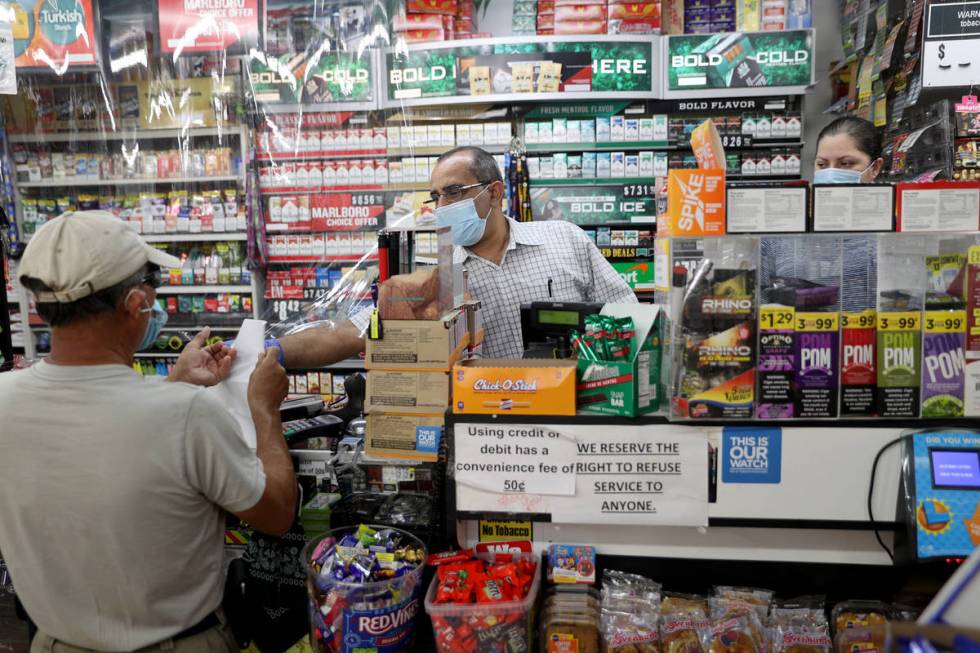
“We still kinda keep going, you know, that’s all we can do. Wear our masks and stay away from each other,” Burnett said.
But some essential businesses, like Romeo Hattawi’s Shop for Less on Main Street, have seen more customers than usual, an issue when trying to follow social distancing and safety guidelines.
No one can enter the convenience store without a mask, and customers on Tuesday kept as far away from each other as possible, weaving around shelves stacked with snacks to avoid contact.
“It’s a big change, you know. It’s an uncomfortable life for everyone,” Hattawi said.
Like Covian, Hattawi thanks his regulars for helping him stay afloat.
“Thank God, you know, that we’re an essential business. It lets us go in and feeding our kids without need for any help,” he said.
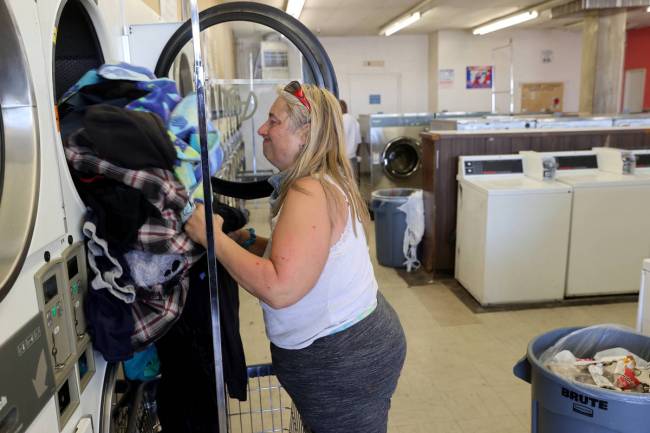
A few miles down Main Street, other essential businesses were just as busy. Cars filled the parking lot of the 99 Cents Only Store and Emmy’s Laundromat, where Michelle Fuller Hines had six washers and dryers running at once.
Hines’ well on her property in Newberry Springs is broken, so she has to drive 20 miles to Barstow anytime she needs water. But she said the pandemic has been a mixed blessing. Hines was on the verge of losing her home because of unpaid back taxes, but the pandemic has given her more time to find a solution.
But Hines makes her living recycling scrap metal and other materials that she solicits and said it’s harder to get those things because people are acting differently.
“They say they don’t care, or they get an attitude, ‘No! I can’t help you,’” she said, beginning to cry. “It’s like, come on. I’m not trying to break anybody out here, I’m just trying to ask for help.”
^
Contact Mick Akers at makers@reviewjournal.com or 702-387-2920. Follow @mickakers on Twitter. Contact Briana Erickson at berickson@reviewjournal.com or 702-387-5244. Follow @ByBrianaE on Twitter. Contact Max Michor at mmichor@reviewjournal.com or 702-383-0365. Follow @MaxMichor on Twitter.













